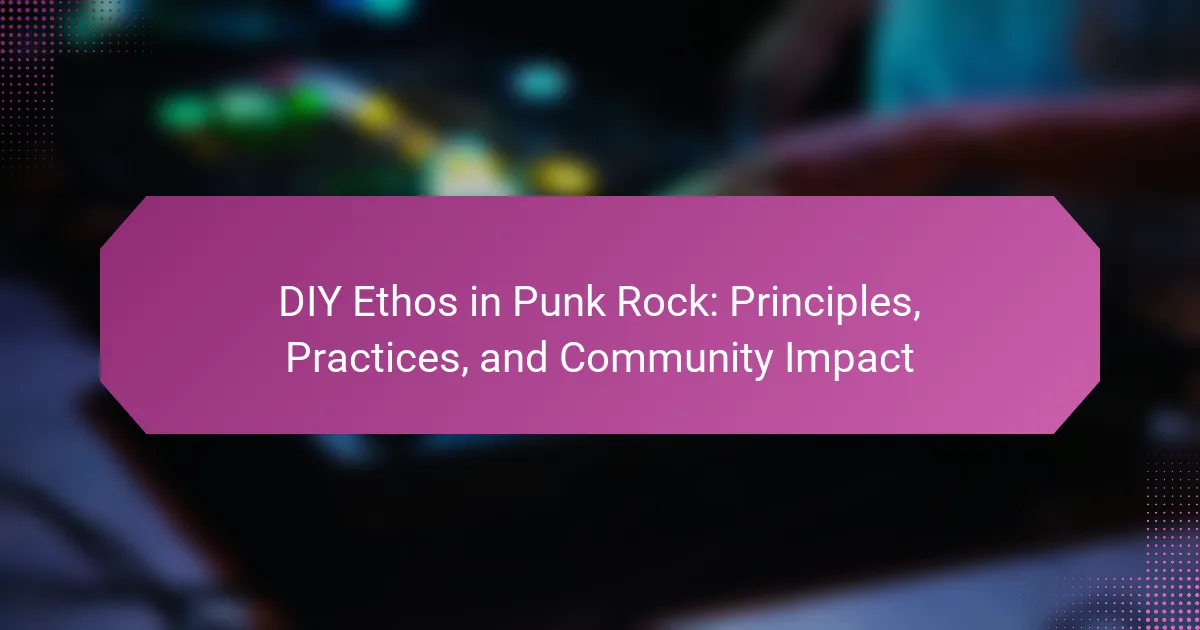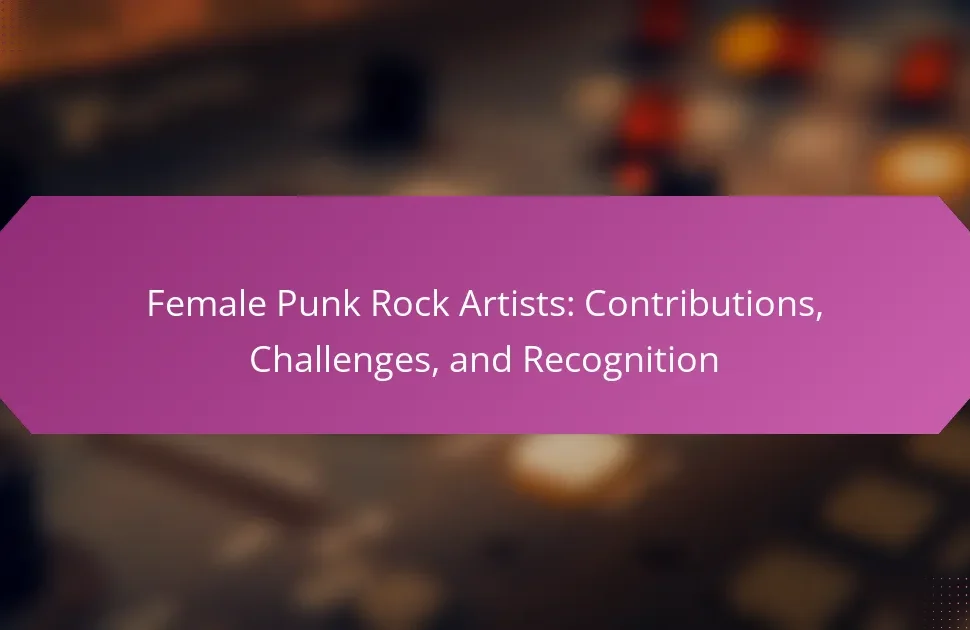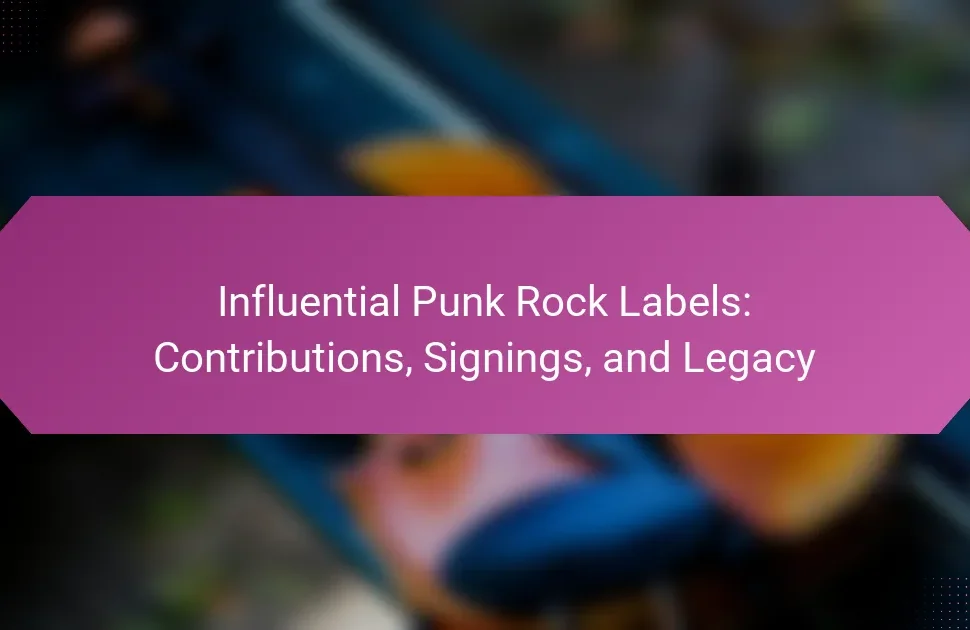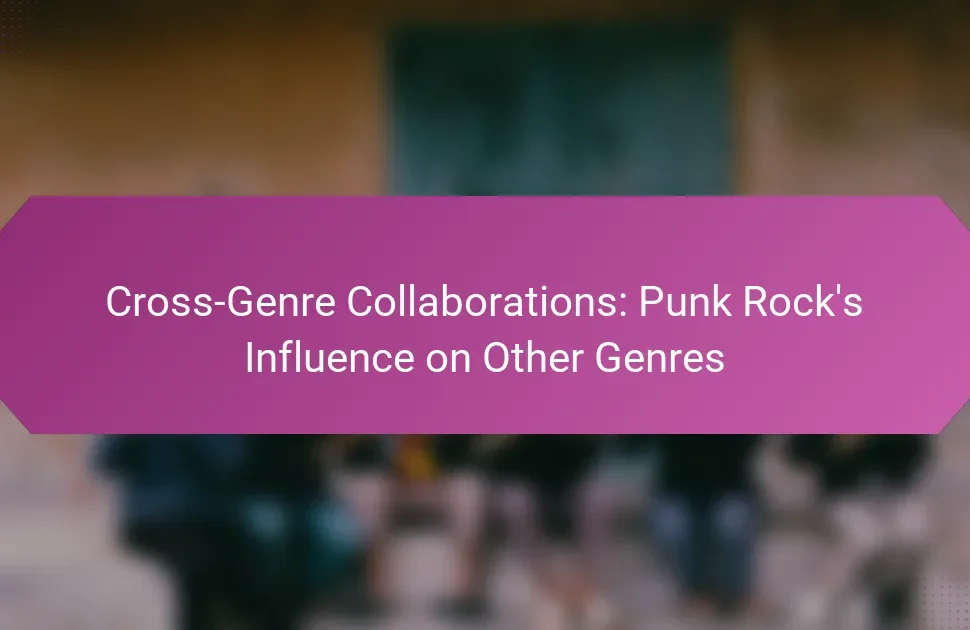The DIY ethos in punk rock empowers artists and communities to create independently, fostering authentic expression and grassroots activism. Key principles include self-sufficiency, rejection of commercialism, and collaboration among musicians. Common practices involve organizing local shows, producing zines, and cultivating community engagement. This approach not only enhances artistic diversity but also drives social change through collective action.
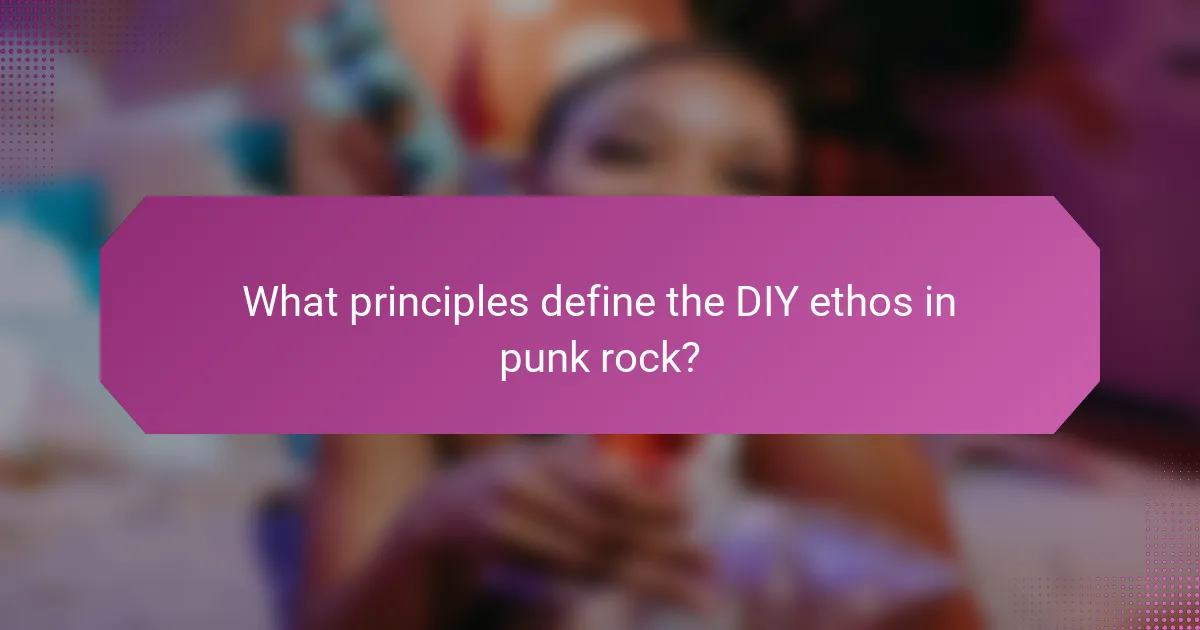
What principles define the DIY ethos in punk rock?
The DIY ethos in punk rock emphasizes self-sufficiency, creativity, and community engagement. It prioritises independent production, allowing artists to create and distribute music without corporate influence. Key principles include a rejection of commercialism, a focus on authenticity, and a commitment to grassroots activism. This approach fosters a strong sense of community, encouraging collaboration and support among artists and fans. The DIY mentality empowers individuals to express themselves freely and challenge societal norms.
How does the DIY ethos promote self-sufficiency and independence?
The DIY ethos fosters self-sufficiency and independence by encouraging individuals to create, repair, and innovate. This approach promotes resourcefulness, as people learn to rely on their skills rather than external services. Engaging in DIY projects builds confidence and a sense of accomplishment. Additionally, the DIY community provides support and knowledge sharing, enhancing collective independence. This ethos often leads to sustainable practices, as individuals repurpose materials and reduce reliance on mass-produced goods.
Why is community involvement essential to the DIY punk movement?
Community involvement is vital to the DIY punk movement because it fosters collaboration, creativity, and social change. This grassroots ethos encourages individuals to actively participate in their local scenes, promoting a sense of belonging and shared purpose. Through organizing events, creating art, and supporting one another, community members amplify their voices and challenge mainstream norms. The unique attribute of DIY punk is its emphasis on self-sufficiency, empowering individuals to create without commercial constraints. As a result, community-driven initiatives often lead to innovative expressions and impactful social movements.
Which historical events shaped the DIY culture in punk rock?
The DIY culture in punk rock was shaped by events like the rise of independent labels, the 1976 CBGB scene, and the 1980s punk zine movement. These events fostered a spirit of self-reliance and creativity. The punk ethos encouraged musicians to produce their own music, organize shows, and create fanzines. This grassroots approach empowered communities and emphasized anti-establishment sentiments. As a result, DIY practices became integral to punk rock identity, promoting artistic freedom and collaboration.
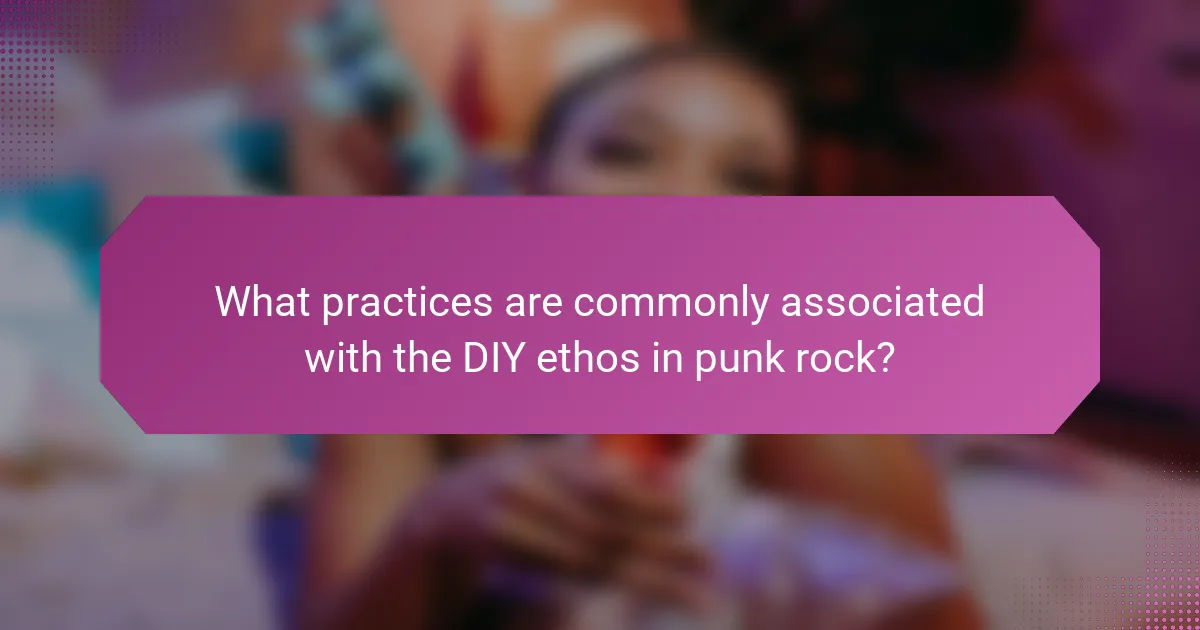
What practices are commonly associated with the DIY ethos in punk rock?
The DIY ethos in punk rock emphasizes self-sufficiency, creativity, and community engagement. Common practices include creating independent music labels, organizing local shows, and producing zines. These activities encourage artistic expression and foster connections among like-minded individuals. Additionally, the ethos promotes a rejection of commercialism, emphasizing authenticity and grassroots initiatives.
How do punk bands utilize DIY recording techniques?
Punk bands utilize DIY recording techniques to maintain creative control and foster community engagement. These methods allow artists to produce music independently, often resulting in authentic sound and lower costs.
Many punk bands record in home studios or utilize portable recording equipment, enabling them to experiment with sound without the constraints of traditional studio environments. This approach encourages collaboration among band members and local artists, strengthening community ties.
The DIY ethos also promotes the distribution of music through independent labels and online platforms, bypassing corporate music industry channels. This accessibility empowers bands to reach audiences directly, enhancing their grassroots appeal.
In summary, DIY recording techniques in punk rock not only facilitate artistic freedom but also cultivate a supportive community, reinforcing the genre’s core values.
What role do independent venues play in the DIY punk scene?
Independent venues are crucial to the DIY punk scene as they provide spaces for self-expression and community building. These venues often operate outside mainstream systems, fostering an inclusive environment for emerging artists. They enable local bands to perform, connect with audiences, and promote the DIY ethos of independence and authenticity. By hosting events, they create a platform for collaboration and innovation, strengthening the punk community’s grassroots nature. Independent venues also reflect the unique characteristics of their local scenes, often featuring diverse genres and styles that resonate with the community’s identity.
How do zines and self-publishing contribute to the DIY culture?
Zines and self-publishing empower DIY culture by promoting creativity and accessibility. They allow individuals to express unique perspectives and share ideas outside mainstream media. This fosters community engagement and collaboration among creators. Zines often emphasize personal narratives and grassroots movements, aligning with the core principles of punk rock ethos. Through self-publishing, creators can challenge norms and distribute content on their terms, reinforcing the DIY spirit.
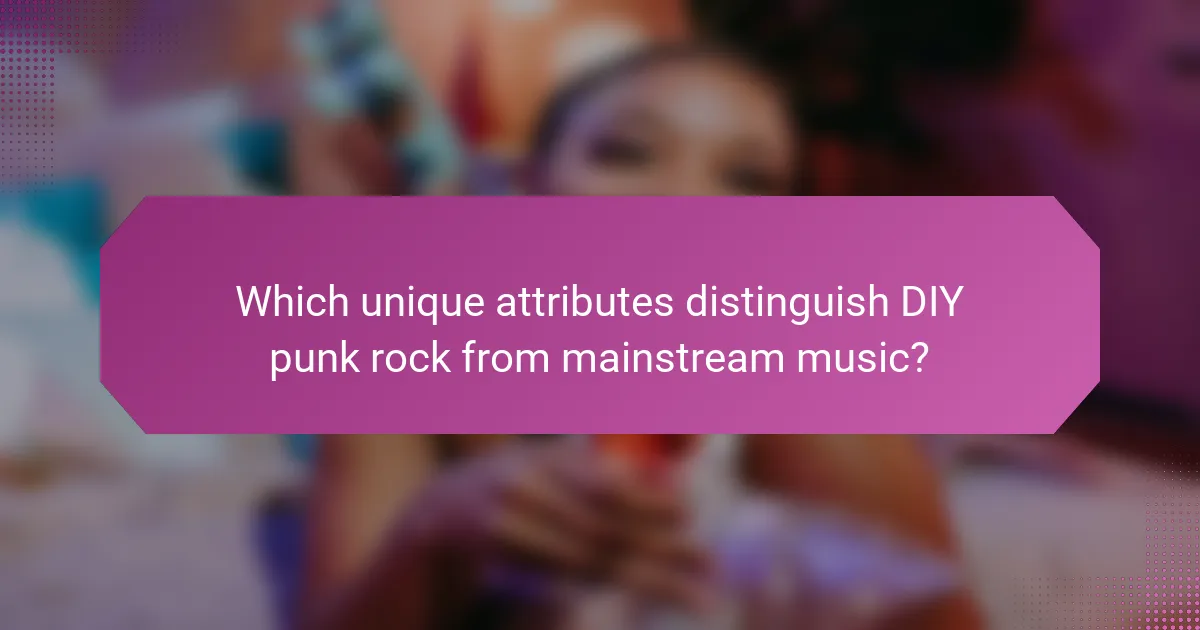
Which unique attributes distinguish DIY punk rock from mainstream music?
DIY punk rock is distinct from mainstream music through its emphasis on independence, authenticity, and community engagement. Unlike mainstream music, which often prioritises commercial success, DIY punk values artistic expression and grassroots collaboration.
One unique attribute of DIY punk is its non-hierarchical structure, allowing artists to create and distribute music without corporate influence. This leads to a more diverse range of sounds and messages. Additionally, DIY punk often fosters local scenes, encouraging community support and collaboration among musicians.
Mainstream music typically relies on polished production values and marketing strategies, while DIY punk embraces rawness and imperfection as a form of authenticity. This approach resonates with audiences seeking genuine connections over commercialised experiences.
Ultimately, the DIY punk ethos champions self-sufficiency and social activism, setting it apart from the more commercially driven nature of mainstream music.
How do aesthetic choices reflect the DIY philosophy in punk rock?
Aesthetic choices in punk rock embody the DIY philosophy by prioritising individuality, authenticity, and self-expression. Punk aesthetics often reject mainstream norms, favouring raw, unpolished visuals that reflect personal and communal identities.
DIY punk fashion frequently includes thrifted or customised clothing, showcasing creativity and resourcefulness. This approach fosters a sense of belonging and empowerment, as individuals create their unique styles rather than conforming to commercial trends.
Album artwork and zines further illustrate this ethos, often featuring handmade designs that emphasize a personal touch. These elements highlight the community’s values of accessibility and collaboration, encouraging fans to participate in the culture actively.
Overall, aesthetic choices in punk rock serve as a powerful medium for expressing the DIY spirit, reinforcing the movement’s core principles of autonomy and resistance against commercialisation.
What are the challenges faced by DIY punk artists in a commercial landscape?
DIY punk artists face significant challenges in a commercial landscape, including financial constraints, limited access to distribution channels, and competition from mainstream music. These artists often prioritise artistic integrity over commercial success, which can hinder their ability to reach wider audiences. Additionally, the DIY ethos fosters a community-driven approach that may clash with commercial expectations, making it difficult to balance personal expression with market demands. The unique attribute of DIY punk is its emphasis on self-sufficiency, which can limit collaboration opportunities with established industry players.
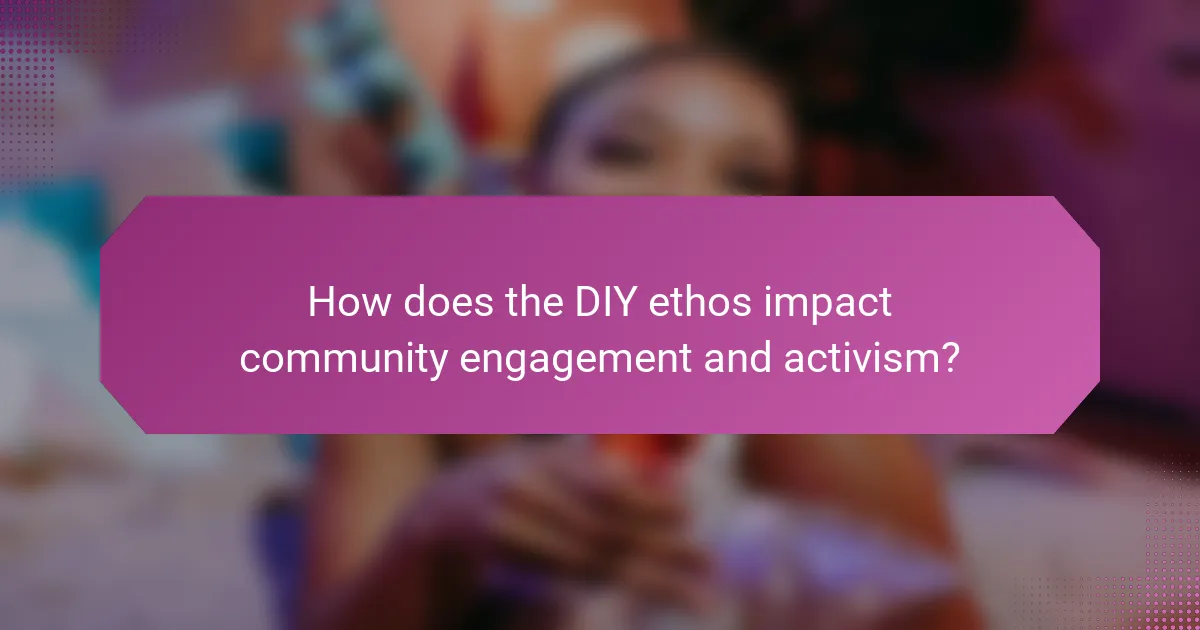
How does the DIY ethos impact community engagement and activism?
The DIY ethos fosters community engagement and activism by promoting self-sufficiency and collective action. This approach encourages individuals to take initiative, share resources, and collaborate on projects that address local issues.
Punk rock’s DIY principles emphasize grassroots organising, leading to increased participation in social movements. For instance, local shows often serve as platforms for raising awareness about social justice.
Additionally, the DIY culture cultivates a sense of ownership and pride within communities. Participants are more likely to invest time and effort in initiatives they help create.
Ultimately, the DIY ethos empowers individuals, strengthens community bonds, and drives activism through shared goals and collaborative efforts.
Which social movements have been influenced by the DIY punk community?
The DIY punk community has significantly influenced various social movements, including environmental activism, anti-globalisation efforts, and feminist movements. These movements share a commitment to grassroots organising and self-sufficiency, reflecting the DIY ethos.
Environmental activism within the DIY punk scene often emphasizes sustainable practices and awareness of ecological issues. Anti-globalisation movements draw inspiration from punk’s critique of corporate culture and advocate for local economies and fair trade. Feminist movements within this context promote empowerment and challenge gender norms, often using punk music as a platform for expression and activism.
These interconnections illustrate how the DIY punk community fosters a spirit of resistance and social change across diverse causes.
How do local DIY scenes foster inclusivity and diversity?
Local DIY scenes foster inclusivity and diversity by creating safe spaces for marginalised voices. These communities prioritise collaboration, encouraging participation from various backgrounds. They provide access to resources and knowledge, empowering individuals to express themselves creatively. Moreover, local DIY scenes often challenge mainstream norms, promoting alternative perspectives and identities. This approach cultivates a sense of belonging, where everyone can contribute and feel valued.
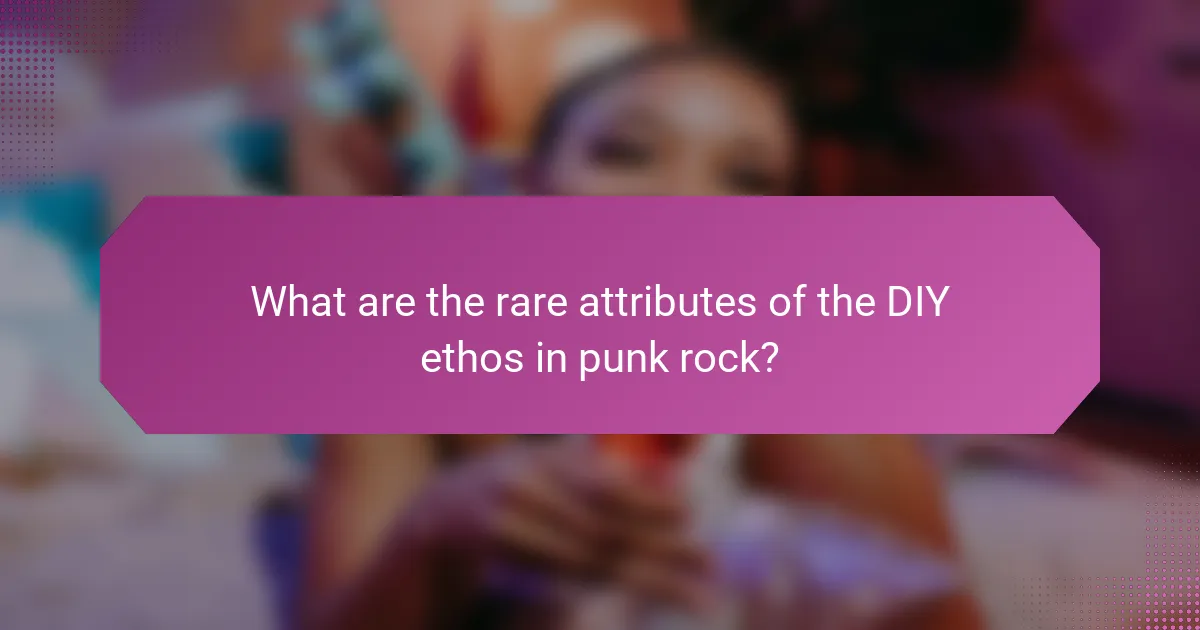
What are the rare attributes of the DIY ethos in punk rock?
The rare attributes of the DIY ethos in punk rock include a focus on non-commercialism, community-driven creativity, and radical self-expression. These traits emphasize individualism and innovation over mainstream acceptance. Punk rock embraces unique forms of collaboration, such as collective music production and grassroots distribution, which are less common in other music genres. Additionally, the ethos often incorporates a strong political stance, advocating for social change and empowerment through art.
How have international punk scenes adapted the DIY ethos uniquely?
International punk scenes have uniquely adapted the DIY ethos by emphasizing local culture, diverse expressions, and community engagement. Each scene tailors its approach to reflect regional issues, fostering a sense of identity. For example, in Latin America, punk often intertwines with political activism, addressing social injustices. In Asian countries, punk incorporates traditional music styles, creating a distinctive sound. These adaptations enhance community bonds and encourage grassroots movements, demonstrating the ethos’s flexibility and relevance across different contexts.
What notable collaborations have emerged from the DIY punk community?
Notable collaborations from the DIY punk community include projects that emphasize independence and creativity. Bands like The Menzingers and The Wonder Years have worked together, showcasing their shared values. Additionally, the collaboration between DIY labels and artists often leads to unique releases that reflect the ethos of self-sufficiency. Events like the Fest in Gainesville, Florida, highlight these partnerships, uniting diverse punk acts under a common mission. This collaborative spirit strengthens community ties and fosters innovation within the genre.
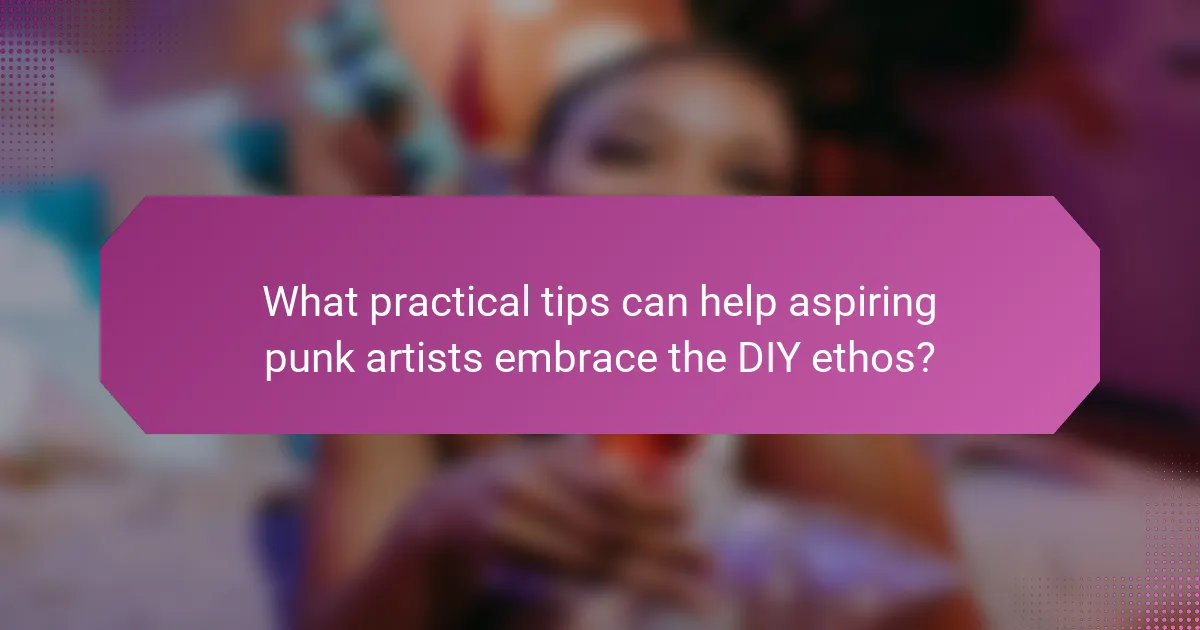
What practical tips can help aspiring punk artists embrace the DIY ethos?
Aspiring punk artists can embrace the DIY ethos by prioritising creativity, resourcefulness, and community engagement. Focus on creating music and art independently, using accessible tools and platforms. Collaborate with local artists to share resources and ideas. Attend DIY workshops to enhance skills and network. Promote your work through social media to build a following without relying on major labels. Use recycled materials for artwork and merchandise to reflect the ethos of sustainability and anti-consumerism.
Which common mistakes should DIY punk artists avoid?
DIY punk artists should avoid common mistakes like neglecting community engagement, underestimating production quality, and ignoring copyright issues. These pitfalls can hinder their artistic expression and connection with audiences.
1. Lack of community involvement can isolate artists and limit their reach.
2. Poor production quality may detract from the message and overall impact of their work.
3. Ignoring copyright can lead to legal issues and undermine their creative integrity.
4. Focusing too much on trends rather than personal vision can dilute authenticity.
5. Overlooking marketing strategies can result in limited visibility and missed opportunities.
How can artists effectively promote their DIY projects without a label?
Artists can effectively promote their DIY projects without a label by leveraging social media, grassroots networking, and community engagement. Utilizing platforms like Instagram and TikTok allows artists to showcase their work, connect with audiences, and build a following. Collaborating with local venues and fellow artists fosters a supportive community and amplifies reach. Engaging in DIY events and festivals enhances visibility and creates opportunities for direct interaction with fans. Consistent branding and authentic storytelling resonate with audiences, reinforcing the DIY ethos.
